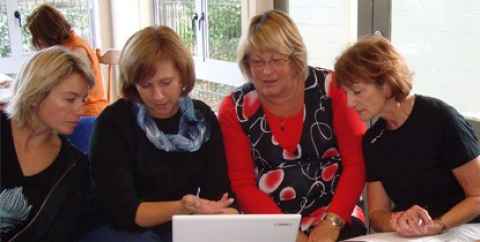Induction and Mentoring Project
This project focuses on beginning teacher learning and development, as well as mentoring skills in primary and intermediate schools – both rural and urban.

Background
Whether by chance or design, beginning teachers (PRTs) learn to teach and are inducted into the profession. Increasingly, educators and policy makers recognise that to promote good teaching, the “by chance” factor requires elimination. This recognition has led to an incremental growth in research and policy initiatives related to induction. For policy makers the motivation has been to address concerns about teacher quality and retention. Certainly the literature provides evidence that support for novice teachers has an impact on retention as teachers are more likely to indicate their intention to remain in teaching when induction programmes are in place (Ingersoll & Smith, 2004). There is less evidence about the impact of induction on teacher quality. Nevertheless, research studies have identified characteristics of effective induction. It is evident in the literature that induction holds different meanings in different contexts and regions (Darling-Hammond, Berry, Haselkorn, & Fideler, 1999; Organisation for Economic Co-operation and Development (OECD), 2005; Totterdell, Bubb, Woodroffe, & Hanrahan, 2004.
Induction programmes vary in purpose, length, quality, effect, and across/within countries. Current programmes vary from one to three hour workshops off site, to one to two year comprehensive programmes. Many induction programmes rely solely on mentoring to support novice teachers (OECD, 2005). Similarly the way in which mentoring is given meaning and practiced, varies widely. Sometimes the reliance on mentoring is overly optimistic. This minimises the impact of the context, leadership and school-wide modeling on beginning teacher learning and development. Good mentoring, that is situated in identified characteristics of comprehensive induction systems and practices, has been recognised as a solution to early career learning and development related problems (Britton, Paine, Pimm, & Raizen, 2003; Feiman-Nemser, 2001; Williams, Prestage, & Bedward, 2001). Despite this evidence, few countries including France, Japan, Switzerland, New Zealand, China -Shanghai, Canada – Ontario, England and Scotland have policy that provides comprehensive resourcing and guidelines for novice teacher induction over time.
A number of studies advocate for mentoring that goes beyond emotional support and practical information to include an educative approach. This differs from programmes that are intended to fix a deficit in teacher practice or to support the teacher’s survival. Educative mentoring requires a vision of good teaching, a regard for new teachers as learners, and consideration of how to develop a principled approach to teaching in order to improve student learning (Achinstein & Barrett, 2004; Norman & Feiman-Nemser, 2005). Despite this, the OECD report found that the majority of countries take a deficit approach to mentoring, with mentors providing “on the job support” to identify and fix deficits in the novice teacher’s practice (2005, p.120)
The development of a teacher’s identity and self concept is a complex process which occurs over time. It involves interplay between students, colleagues and community in situations where conflicting and competing perspectives, beliefs and practices exist (Bullough, 1989, Flores and Day, 2006). Given the complexity of such learning and development, well planned induction, that is responsive to beginning teacher needs, is important to early career learning and professional development. While there is increasing research in the field of teacher learning, more is required to provide insight into the way beginning teachers are supported to learn and develop if meaningful induction practices are to be provided.
About this research
Our aim is to develop further understanding of effective induction and mentoring to inform the national policy on induction, the Teaching Council of Aotearoa New Zealand Guidelines for Induction and Mentoring Programmes and for Mentor Teacher Development in Aotearoa New Zealand by examining:
- The role school leaders and mentor teachers play in translating the national induction system into school based induction programmes;
- How provisionally registered teachers’ (PRTs) learning and development is supported by leaders, mentors and school staff during the first two years of their teaching career to meet the Registered Teacher Criteria (October 2009);
- The understandings, attitudes and skills educative mentors require to focus PRTs’ learning on valued student outcomes;
- The extent assessment practices (both formative and summative) affect confidence in the judgements made about the PRT’s ability to meet the Registered Teacher Criteria.
There are two main parts to the project:
- Professional development and intervention with principals, school leaders and mentors.
- Research into effective beginning teacher induction and mentoring.
Articles and reports
Contact us
Principal Investigator
Dr Frances Langdon
Email: f.langdon@auckland.ac.nz
Lecturer/Facilitator
Annaline Flint
Email: a.flint@auckland.ac.nz
Postal address
School of Learning, Development and Professional Practice
Faculty of Education and Social Work
The University of Auckland
Private Bag 92601, Symonds Street
Auckland, 1150
New Zealand